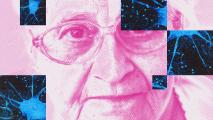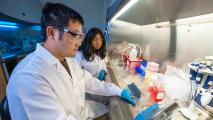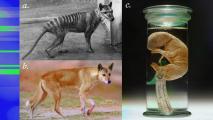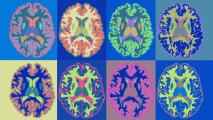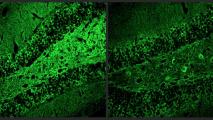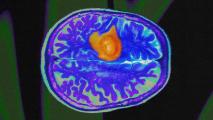
Biotech
Human history has been all but defined by death and disease, plague and pandemic. Advancements in 20th century medicine changed all of that. Now advancements in 21st century medicine promise to go even further. Could we bring about an end to disease? Reverse aging? Give hearing to the deaf and sight to the blind? The answer may be yes. And soon.
More
Octopus tentacle-like patch delivers drugs through your cheek
A needle-free drug delivery system inspired by octopus tentacles could one day replace injections for administering biopharmaceuticals.
ChatGPT forces us to ask: how much of “being human” belongs to us?
Large language models have been trained on massive amounts of “natural” human language — just like us. Does this make the robots part human?
Rare mutation may counteract “Alzheimer’s gene”
A rare mutation suggests that using CRISPR to reduce the expression of the APOE-e4 gene could help treat or prevent Alzheimer’s.
New CRISPR tool has an “on/off” switch
By splitting a base editor into two parts, researchers could give it an “on/off” switch that appears to make it safer and more effective.
CRISPR is helping “de-extinct” the Tasmanian tiger
“De-extinction” researchers believe they might be able resurrect the Tasmanian tiger and restore ecological balance in Australia.
New “multipronged” gene therapy reverses paralysis in mice
A new gene therapy that guides nerve regeneration across complete spinal cord injuries restored the ability to walk in paralyzed mice.
Artificial wombs for preemies move closer to human trials
A panel of FDA advisors has met to discuss the development of artificial wombs designed to help extremely premature babies survive.
Gene-edited pig heart gives a dying man a second chance at life (Updated)
For the second time ever, a gene-edited pig heart has been transplanted into a person with terminal heart disease.
An implantable device could enable injection-free control of diabetes
MIT engineers designed an implantable device that carries islet cells along with its own on-board oxygen factory to keep the cells healthy.
Spending time in space can harm the human body − but scientists are working to mitigate these risks before we go to Mars
With NASA planning more missions to space in the future, scientists are studying how to mitigate health hazards that come with space flight.
New “inverse vaccines” could be key to curing autoimmune disorders
“Inverse vaccines” that teach the immune system to tolerate triggering molecules could be the key to curing autoimmune disorders.
Can you speed up your metabolism? And should you?
Our metabolism is the force inside our bodies that mysteriously decides whether to convert food into energy or weight.
Here’s what’s new in the latest COVID-19 boosters
The FDA has approved new COVID-19 boosters from Moderna and Pfizer-BioNTech. Here’s what you need to know about the shots.
UT med students can now get a dual degree in AI
The University of Texas at San Antonio has launched what it says is the US’s first dual degree in medicine and AI.
Molecule reduces inflammation in Alzheimer’s models
A potential new Alzheimer’s drug represses the harmful inflammatory response of the brain’s immune cells, improving cognition in tests.
Tooth decay: Mouthwash turns your teeth blue when it’s time to go to the dentist
A mouthwash solution containing ferumoxytol and a dye could treat, prevent, and diagnose tooth decay, according to UPenn researchers.
Scientists grow “human-ish” organs in pigs for the first time
Partially human kidneys have been grown in pig embryos, marking the first example of anyone growing solid human organs in another species.
Brain implant lets cancer patients try 20 different drugs at a time
A microdevice that injects up to 20 drugs into gliomas at once could help doctors quickly identify the best treatment for cancer patients.
An enormous study links intelligence and personality in surprising ways
A database containing over 1,300 studies from across the world establishes reliable relationships between personality traits and cognitive abilities.
Get inspired with the most innovative stories shaping the world around us.















